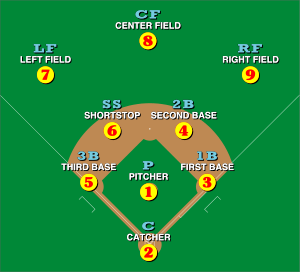
In the sport of baseball, each of the nine players on a team is assigned a particular fielding position when it is their turn to play defense. Each position conventionally has an associated number, for use in scorekeeping by the official scorer: 1 (pitcher), 2 (catcher), 3 (first baseman), 4 (second baseman), 5 (third baseman), 6 (shortstop), 7 (left fielder), 8 (center fielder), and 9 (right fielder).[1] Collectively, these positions are usually grouped into three groups: the outfield (left field, center field, and right field), the infield (first base, second base, third base, and shortstop), and the battery (pitcher and catcher). Traditionally, players within each group will often be more able to exchange positions easily (that is, a second baseman can usually play shortstop well, and a center fielder can also be expected to play right field); however, the pitcher and catcher are highly specialized positions and rarely will play at other positions.
- ^ Spatz, Lyle (2012). Historical Dictionary of Baseball. Scarecrow Press. p. 3. ISBN 9780810879546.